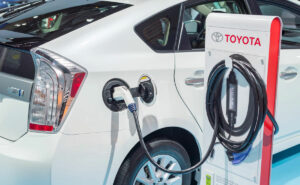In a context where the transition towards electric mobility is advancing at different rates in Europe, Japan is betting on an alternative that could change the future of transportation: hydrogen propulsion. While some European countries have accelerated the adoption of electric cars, others still show modest growth. Faced with this scenario, Toyota, one of the giants of the Japanese automotive industry, has launched an ambitious plan to develop a hydrogen refueling network on the continent.
Toyota announced an alliance with the companies Engie and Hydrogen Refueling Solutions (HRS) for the creation of hydrogen stations in Europe. This plan is part of the ‘RHeaDHy’ project, a pilot initiative funded by the European Union that seeks to accelerate the expansion of hydrogen infrastructure in mobility.
The main objective of the project is to develop a medium-flow hydrogen dispenser capable of refueling two vehicles simultaneously. Thanks to this technology, a significant reduction in refueling times is expected, improving the efficiency of the system.
 electric cars[/caption>
electric cars[/caption>
Goodbye to the electric car?
Toyota’s interest in hydrogen is not new, but its commitment has intensified in the face of the challenges facing electric mobility, such as the lack of charging infrastructure and the dependence on scarce materials for battery manufacturing. With this new approach, the company aims to position hydrogen as a viable and competitive alternative.
Initial refueling tests will be carried out with trucks, with promising results: Toyota estimates that these vehicles could achieve ranges of up to 600 kilometers with just six minutes of refueling, or extend the range up to 900 kilometers in 12 minutes. In the case of cars like the Toyota Mirai, the charging time would be reduced to just five minutes, approaching the speed of traditional fuels.
A transformation in European mobility
The European Union will closely monitor the development of this technology, aligned with its decarbonization goals. In fact, Brussels has established that by 2030 there should be a hydrogen station every 200 kilometers, which would facilitate the adoption of hydrogen in transportation.
With this ambitious plan, Japan not only seeks to consolidate hydrogen as a viable alternative, but could mark a turning point in the dominance of the electric car in Europe. While the continent debates its energy future, Toyota is moving forward with a proposal that promises to revolutionize sustainable mobility.
 Toyota-electric-cars[/caption>
Toyota-electric-cars[/caption>
What are the benefits of electric cars?
Electric cars have many benefits, both for the environment and for drivers.
Environment
- Reduce air pollution
- Help mitigate climate change
- Decrease dependence on fossil fuels
- Improve air quality
- Reduce respiratory, visual, and cardiovascular diseases
Drivers
- They are more comfortable, with dynamic acceleration, without noise or vibrations
- They have an “automatic” transmission that simplifies driving
- They are more efficient in maintenance
- Save on fuel
- They are more durable
- Require little maintenance
- They are easier and quicker to charge
- Tax advantages
- In some places, electric cars have tax exemptions or reductions
Other benefits
- Contribute to making cities quieter and less stressful
- Are seen as an attractive solution for drivers who want to contribute to a more sustainable future.
Do you already know our YouTube channel? Subscribe!

